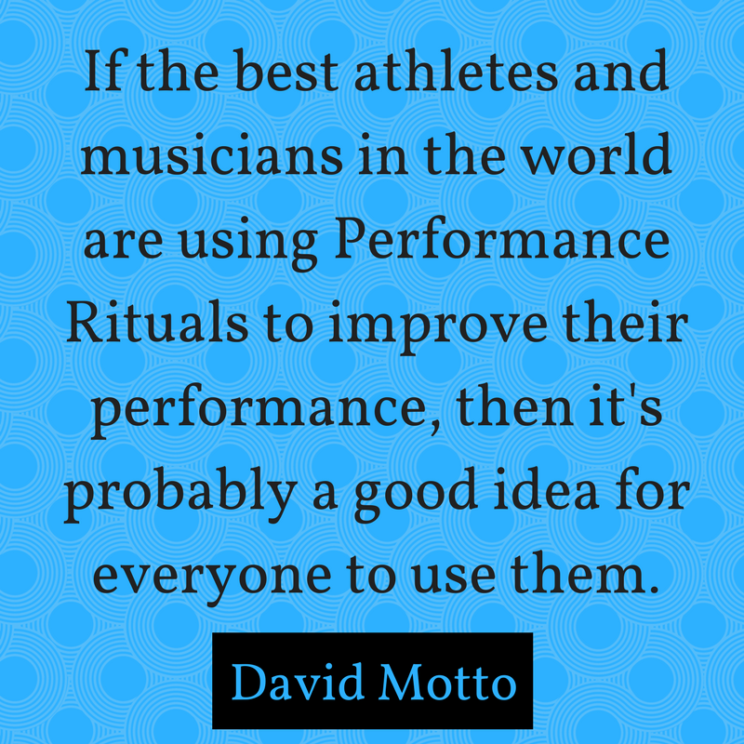David Motto’s Practice Tip of the Week:
How to Feel Calm and Stay Focused
Transitioning into the Zone
Making the transition from all the crazy activity of your day to the relative calm of your practice room is not automatic.
This transition, though, is extremely important. When you’re practicing, you can’t be distracted by thoughts of all the non-musical parts of your life. Practicing with these non-music thoughts on your mind is, how can I put this nicely, A TOTAL WASTE OF YOUR TIME AND EFFORT!
To get the most out of the limited amount of time you have in the practice room, you need to develop a highly focused level of awareness. And, you need to be calm and in the zone so that your assessments of your playing are as accurate as possible.
The Performance Ritual:
An Effective Way to Calm Down and Focus

An extremely effective way to calm down and rapidly expand your focus and sense of self-awareness is to have a specific, short activity you perform just before you start playing your instrument. This activity, when repeated before every practice session, rehearsal, and performance, becomes your personal Performance Ritual.
The Performance Ritual centers your thoughts and signals that you are about to enter the musical realm of your life. The Performance Ritual is a gateway that opens you up to your music, allowing you to leave the rest of your life behind.
Performance Rituals are commonplace in the world of elite sports, where they are put on view for all the world to see. These rituals are also used extensively by elite-level musicians, but they are often hidden from the audience.
If the best athletes and musicians in the world are using Performance Rituals to improve their performance, then it’s probably a good idea for everyone to use them.
Creating Your Own Performance Ritual
Here are a few examples of Performance Rituals that may inspire you as you come up with your own:
- Controlled Breathing:
Take a specific number of deep breaths. Or, inhale slowly through your nose and exhale sharply out your mouth. Focusing on breathing is a centuries-old technique used in meditation and mindfulness training. It does wonders for performers. - Pre-planned Movement:
Adjust your instrument, microphone, chair, piano bench, music stand, eyeglasses, or some object in a consistent way. Clench your fists or stretch your fingers – exactly the same way each and every time before you play. Or, hold onto a good luck charm or a favorite piece of jewelry in your pocket. Even taking a second to look in the same direction just before you play can be enough to center your thoughts, keep you calm, and get you ready for peak performance. - Encouraging Words:
Silently say specific, consistent words of encouragement to yourself. I call these words your Musical Mantra. You can come up with a phrase or sentence that consistently reminds you to do your best and that will get you into the zone.
Experiment. Try out different Performance Ritual ideas for a few days. See what sticks. Make adjustments. Search out the most effective rituals for you. Everyone is unique and your ritual(s) will be unique to you.
Performance Rituals – Hidden in Plain Sight
Ever wonder why you see certain athletes wearing jewelry during competition? Check out these Olympic athletes talking about their good luck charms. They have some very moving stories, and the significance of their good luck charms helps propel them to success.
Physical objects are only one aspect of Performance Rituals. My favorite ritual is the musical mantra because what you say to yourself and what you think about when you are playing your instrument have an enormous impact on the results you’ll achieve. A mantra helps you regain your focus whenever you need it.
Here’s a fascinating video about how a few seconds of movement, thoughts, and ritual affect the highest-level tennis players – during the time they’re not playing tennis:
A Very Public Performance Ritual – Seen by Millions
In addition to the two videos above, there’s one more I want to share with you because this is the athlete who made me think seriously about the importance of rituals for musicians. I hope you find it as valuable as I do.
It’s a video of Boston Red Sox player Manny Ramirez at bat. Watch it with the sound off. You’ll see his ritual before every pitch: (1) Push down the helmet, (2) tap home plate twice, (3) circle the bat a couple times:
Talk about a high level of focus! He’s been doing these moves for so long that they seem automatic – and almost as important as how he swings his bat. Just imagine if you had a Performance Ritual this powerful!
You Can Depend on Your Performance Rituals
I highly recommend developing your own rituals to help you successfully start your practicing and performance runthroughs. By going through these ritual processes every day, they will eventually become natural and habitual.
Then, you’ll be able to depend on your Performance Rituals to keep you calm, focus your mind, and allow you to perform at the top of your game.
Have any Performance Rituals you use? Know of any rituals used by famous musicians? If so, please comment below with the information or any videos of you or other musicians performing their rituals.
To Your Musical Success!
David Motto

Something must be working for Tal, given her amazing playing with Jeff Beck – among others. Let me know how adding your meditation/mantra practice to your music practice works for you. Thanks for your comment!
I’ve seen a backstage photo of Tal Wilkenfeld in a meditation pose. Loved it! I am a firm believer in daily meditation, and I will now apply it (along with a mantra) to my practice and performance routine! Thanks, David!